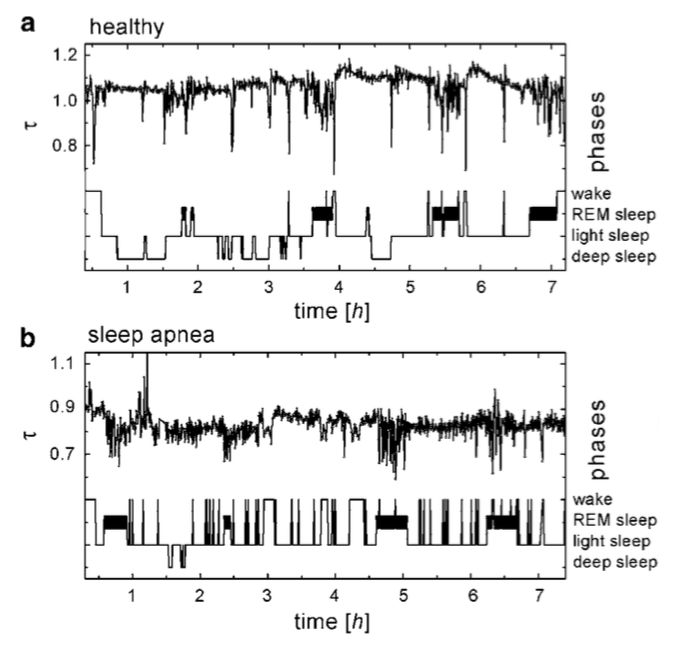Most people like to think of total sleep time as the main metric associated with sleep quality, but in fact the first four hours are the period for key restorative functions, especially in athletes & sports people.
This is because most deep (or slow wave) sleep occurs during this period.
During slow wave sleep:
- Adrenal hormone production is inhibited, shifting the body and brain from sympathetic to the parasympathetic nervous system dominance needed for recovery
- Human growth hormone is produced, which enables repair and rebuilding of muscles & other tissues from food digested during the day
- New memories are consolidated
The image below, taken from an HRV sleep study by Penzel (2003) contrasts the dominance of deep sleep during the first few hours in a normal person with that of someone with sleep apnea (ie severe snoring or breathing problems). Note also the HRV pattern (Tau), which shows increasing parasympathetic activity in healthy sleep contrasted with the reduction (and therefore stress) in the person with sleep apnea.
As well as conditions like sleep apnea, alcohol, work stress and intensive exercise late in the day can limit our amount of deep sleep, whereas aerobic exercise and a regular pre-bed relaxation pattern can facilitate deep sleep. In fact, as summarized in this blog post , higher HRV before bedtime seems to enable a more rapid & effective transition to good quality sleep.
#TuesdayTip: So the old adage of ‘an hour’s sleep before midnight is worth two after’ could have good science behind it after all!


Can you post a link to the article that you talk about here.
Thank you!
Certainly, full text available here:
http://www.nature.com/npp/journal/v28/n1s/full/1300146a.html
Just a question Simon: Sometimes what happens is that the color of the HRV figure (Ithlete app) doesn’t match what appears on the activity summary (Ithlete pro). The summary says I shouldn’t push myself too hard showing me an orange circle but the HRV is high and green or vice versa. What should I do in these cases?
hi Luigi,
The ithlete Pro Training Guide summary is a more complex analysis, and can give slightly different advice. The reasons for this are explained here:
http://www.myithlete.com/tuesday-tip-ithlete-pro-training-guide/
Hope this helps!